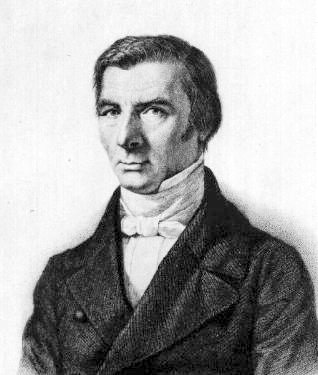
Frédéric Bastiat
Claude-Frédéric Bastiat (/bɑːstiˈɑː/; French: [klod fʁedeʁik bastja]; 30 June 1801 – 24 December 1850) was a French economist, writer and a prominent member of the French Liberal School.[1]
"Bastiat" redirects here. For the rugby union player, see Jean-Pierre Bastiat.
Frédéric Bastiat
24 December 1850 (aged 49)
Rome, Papal States
A member of the French National Assembly, Bastiat developed the economic concept of opportunity cost and introduced the parable of the broken window.[2] He was described as "the most brilliant economic journalist who ever lived" by economic theorist Joseph Schumpeter.[3]
As an advocate of classical economics and the economics of Adam Smith, his views favored a free market and influenced the Austrian School.[4] He is best known for his book The Law, where he argued that law must protect rights such as private property, not "plunder" others' property.
Views[edit]
Bastiat asserted that the sole purpose of government is to protect the right of an individual to life, liberty and property and that it is dangerous and morally wrong for government to interfere with an individual's other personal matters. From this, Bastiat concluded that the law cannot defend life, liberty and property if it promotes legal or legalized plunder which he defined as using government force and laws to take something from one individual and give it to others (as opposed to a transfer of property via mutually agreed contracts without using fraud or violent threats against the other party, which Bastiat considered a legitimate transfer of property).[16]
In The Law, Bastiat explains that if the privileged classes or socialists use the government for legalized plunder, this will encourage the other socioeconomic class to also use legal plunder and that the correct response to the socialists is to cease all legal plunder. Bastiat also explains why his opinion is that the law cannot defend life, liberty and property if it promotes socialist policies. When used to obtain legalized plunder for any group, he says that the law is perverted against the only things (life, liberty and property) it is supposed to defend.[16]
Bastiat was a strong supporter of free trade who was inspired by and routinely corresponded with Richard Cobden and the English Anti-Corn Law League and worked with free-trade associations in France.[4]
Because of his emphasis on the mutual gains to be had from free exchange, on subjective value, and on the importance of deductive reasoning (as opposed to mathematical models) in deriving economic conclusions, Bastiat has been described by Mark Thornton, Thomas DiLorenzo and other economists as a forerunner of the Austrian School, with Thornton positing that through taking this position on the motivations of human action he demonstrates a pronounced "Austrian flavor."[17]